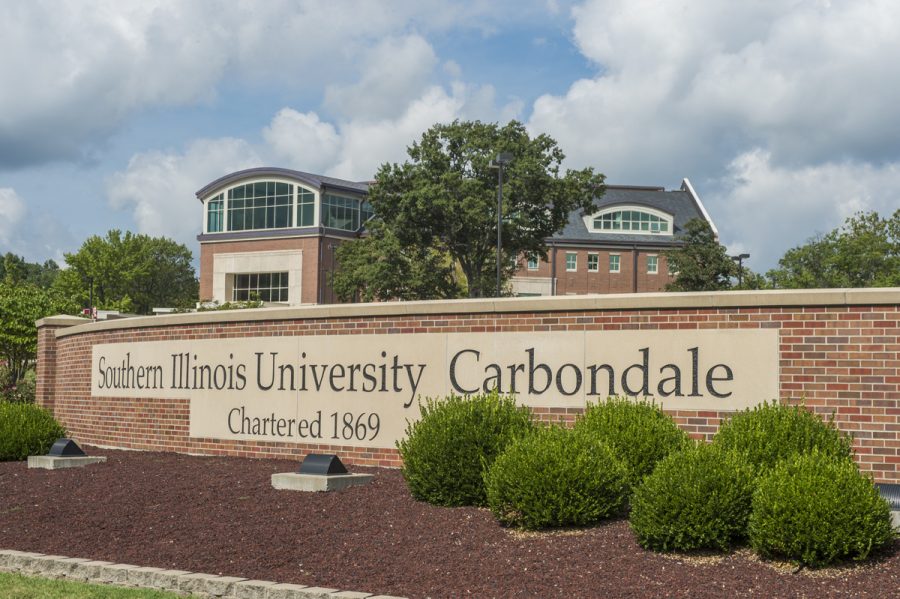Despite problems, medical pot entrepreneurs upbeat about future in Illinois
March 26, 2016
Is the Illinois medical cannabis industry in danger of failing?
Six months after the state’s first medical cannabis dispensaries opened for business, some entrepreneurs and analysts believe it is. Their concerns stem from the fact that only 5,000 state residents have so far received registry cards, or about one-tenth of what industry investors were hoping to see a year ago.
A big reason for the low numbers centers on Republican Gov. Bruce Rauner’s refusal to expand the list of 39 original qualifying medical conditions that allow patients to obtain the required cannabis cards.
Advertisement
Even so, Tanya Griffin remains an optimist about the future of Illinois’ medical cannabis industry.
MORE: SIU student, veteran talk about medical pot
Griffin, a metro-east native, acknowledges that keeping a positive attitude has not been easy. The director of Illinois operations for the The Green Solution, a Denver-based chain of dispensaries, Griffin been waiting months to open the medical cannabis dispensary licensed for Sauget, one of two permitted for the metro-east under the state program.
“It’s painful right now,” said Griffin, who expects her dispensary to open in Sauget in mid-April. “We wish there were more [qualifying] conditions, we wish there were a more hospitable environment.”
But Griffin remains upbeat.
“It’s disheartening. We’d like more people to have access,” Griffin said. “But ultimately people will find a way. It’s like they figure out how to get their driver’s license even though they have to go back three times. This is a crazy ride we’re on.”
Griffin’s optimism is shared by other medical cannabis industry observers and investors, at least in the long-term. But short-term, the industry — which is in the third year of a five-year pilot program — faces some serious challenges.
Advertisement*
In January these challenges were the focus of a story published in Forbes that carried the ominous headline, “Illinois Medical Marijuana Program In Danger Of Failure.” The article warned that the “low number of approved patients could force some marijuana businesses to close just as the program is getting underway.”
The article noted that an online petition by change.org to include more medical conditions had collected 18,000 signatures, and that singer Melissa Etheridge, who has suffered from breast cancer, had joined the struggle.
On her Twitter feed, Etheridge wrote: “I believe in this medicine. Petition: Let More People in Illinois Access Medical Cannabis.”
Chris Lindsey, an analyst with the Marijuana Policy Project, said it’s probably too early to say what the industry’s future will be in Illinois.
“But it’s certainly troubling,” he said of the low patient count. “But a lot of the problems the state is experiencing now are not a big surprise. I think we hoped to see a lot more patients.”
For Illinois, “the No. 1 priority is that the program be extended to continue beyond its current sunset date” in early 2018, Lindsey said.
Lindsey said it would “be a real shame” if the program is ended while its participation is so restricted.
“So then it’s over before it could start,” he said. “What a tremendous disservice to patients if this is allowed to happen.”
Another issue is the problems that patients encounter in finding physicians willing to sign cards that allow patients to shop at dispensaries. Also, the state’s on-line registration process can also be a real hassle, according to Griffin.
“Just a lot of hurdles. It’s the DMV on steroids,” she said. “I have highly-educated, computer-savvy people calling me in a tailspin that can’t get through even the online application. And these aren’t 80-year-olds who can’t function on a computer. These are 30-year-olds helping their parents or helping somebody sick that can’t get through the process.”
Lindsey said he believes the state cannabis industry will ultimately survive because “public opinion polls show that Illinoisans have a tremendous amount of support for their medical marijuana program. And that’s consistent with what voters are saying around the country.”
MORE: Illinois voters heavily support medical marijuana
The latest poll conducted by the Paul Simon Public Policy Institute at SIU underscores Lindsey’s views on the popularity of medical cannabis in Illinois.
When asked whether they favor or oppose legalized medicinal marijuana in Illinois, 82 percent expressed support for the policy. Only 16 percent opposed it and 3 percent did not know or answered otherwise, according to the poll.
Overall support for medical marijuana has increased dramatically — by 19 percentage points — and opposition has been cut in half since a 2013 institute poll asked a similar question. The 2013 poll showed 63 percent support and 32 percent opposition. The 2013 poll was taken before the current medicinal marijuana pilot program was in effect.
“I don’t believe that at the end of the day the voters are going to stand by and watch their own program get dismantled through lack of attention,” Lindsey said. “I think they’re going to step and up and say ‘you’ve really got to get this program in shape.'”
Jeffrey Zucker, the founder of Denver, Colo.-based Greenline Partners, a cannabis industry consulting firm, acknowledged that a lot of concern surrounds the Illinois program. But Zucker said the public support will inevitably result in changes to the pilot program that will increase patient access and ensure its long-term future.
“There’s enough momentum behind it that no matter what’s going on in the statehouse, it’s going to get pushed through into a more useful program,” Zucker said. “There’s only so long that you can ignore the constituency. I believe Illinois will see the economic benefit that cannabis is providing to the other states, and the lack of downsides being seen in the statistics.”
Before the Illinois program ends in 2018, the necessary changes in the program will occur and Rauner will come on board to support it, Zucker predicted.
“My hope is given [Rauner’s] background, seeing the economic benefits from the other states, as well as the positives in not affecting crime rates, and getting people off of opiates, will push him to be supportive,” he said.
Leslie Bocskor, the founder and president of Electrum Partners, a cannabis consulting firm in Las Vegas, Nev., agreed with other observers interviewed that 5,000 patients is too few to sustain a market the size of Illinois.
“It should be 10 times and 20 times that current number,” Bocskor said.
One of the things that Illinois could do to jump-start its patient numbers would be to emulate the Nevada state government’s decision to allow cannabis reciprocity with other states. So patients who are qualified to buy medical cannabis in their home states would be allowed to buy it in Illinois, he said.
“And so reciprocity would be one thing they could do that would be really an expansion that would be great for the industry, great for the state and good in general,” Bocskor said.
Another state Illinois could copy is Maryland, which allows patients to get cannabis recommendations from Maryland physicians no matter where the patients live.
“So in that sense you could go to Maryland, get a doctor’s recommendation and use a dispensary there,” he said. “The more medical marijuana patients that Illinois gets, the lower the crime will be, the more robust the regulatory framework is. The less money that goes inot the hands of criminals who are doing bad things.”
Despite its problems and rocky start, the Illinois program has already won the support of the patient-focused medical marijuana advocacy group Americans for Safe Access (ASA), which in its 2016 report graded the 50 states for their medical marijuana programs or lack thereof. Illinois tied with California for the top overall average score of 88.
Tanya Griffin, who oversees Illinois operations for TGS, believes things will work out eventually for both medical cannabis entrepreneurs and patients.
“There’s no point in worrying,” Griffin said. “It’s a roller-coaster ride. It’s a bumpy road. We’re going to look back on this like it’s childbirth. We’re not going to remember this — we’re just going to have the next baby.”
___
(c)2016 the Belleville News-Democrat (Belleville, Ill.)
Visit the Belleville News-Democrat (Belleville, Ill.) at www.bnd.com
Distributed by Tribune Content Agency, LLC.
Advertisement










